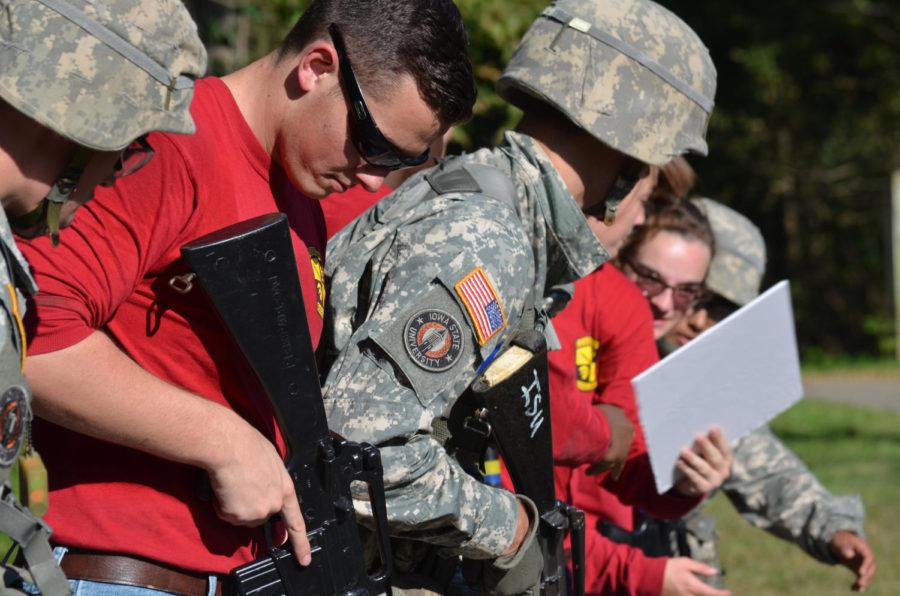AROTC travels to Camp Dodge for realistic training
Katy Klopfenstein/Iowa State Daily
One of five Army ROTC platoons who met for a team building exercise. They worked on team building exercises in Brookside Park on Sep. 16. Cadets pretend to cross a river.
September 29, 2015
First call: 0500. Lights out: 2300. Repeat.
Army ROTC cadets traveled to Camp Dodge in Johnston, Iowa, during the weekend to participate in their annual Fall Field Training Exercise known as Operation: Cyclone Fury.
The concept of the operation the cadets participated in revolved around five phases.
Phase one was preparation and orders process, phase two involved M16 rifle range training and a virtual video game called Virtual Battlespace, phase three included teaching medical training and phase four and five involved a battalion Virtual Battlespace game and recovery.
Evan Ireland, senior in supply chain management, has participated in the training for the past four years.
“What we do is each week we do our leadership labs where we go over things like small-unit tactics, basic medical care and just army and soldering skills,” Ireland said. “And for every [year’s training], we try to take [the cadets] out of the classroom and go apply it elsewhere.”
Ireland listed some of the things that the cadets did during the training weekend.
“So, for example, this weekend we shot the M16 rifle and the M9 pistol. A lot of these kids have never touched a weapon, much less fired one, so we wanted to get them out, put some browns on range and do legitimate training,” Ireland said. “We also taught them how to ‘call for fire’ for artillery. We put them through a medical training stimulator as well as a sort of video game, it’s called [Virtual Battlespace 3] training. It allows them to be put in challenging scenarios and test the skills that we teach them throughout the semester.”
A favorite activity among the cadets, the virtual video game offered a chance for the Cyclone Battalion to interact with each other and take and give commands in real war scenarios that a non-virtual world couldn’t offer.
“The [game], the stimulator that we got to do, that was very interesting,” said Haley Glowik, freshman in civil engineering. This was Glowik’s first year participating in the training.
“It really helped you understand more of what was going on because you could kind of step back in a situation and be like, ‘Well, okay, my squad leader’s here’ and that kind of thing,” Glowik said about the Virtual Battlespace 3 game.
Glowik enjoyed the opportunity to get to know her battalion a better.
“Coming in, I was really nervous because I’m like a little freshman, and we didn’t have too many freshmen out there this weekend,” Glowik said. “Everyone was just so helpful and welcoming, and they’re such great leaders. It was really great to watch them and learn about what we’re going to be doing in the next couple years.”
Alex Shum, senior in interdisciplinary studies, also enjoyed the camaraderie that the training built between him and other cadets and their platoons.
Shum, who participated in the training for the first time this year, noted some of the opportunities that the training provides cadets, such as getting thrown in leadership positions.
Shum, along with Peter Watkins, freshman in animal ecology, both became platoon sergeants for part of the weekend.
“At first I was just shocked because I didn’t see it coming at all, even though I should have,” Shum said. “It was a good experience. I haven’t had much experience doing anything like that, but now I’d feel a lot more confident if I had to step into that role again.”
Watkins noted that stepping into the leadership position really helped his confidence when it came to being able to lead.
“[The platoon commander] was the voice, and I was the hands,” Watkins said. Watkins noted that for this training, the integration of second-year cadets was something the training pushed to include.
The training changes from year to year. This could mean a stronger focus on team building, running missions or more class work.
Watkins noticed how this year differed from previous years because of the stronger focus on combat and building teamwork.
Ireland’s learned to take what the cadets were learning at Iowa State and realistically apply them.
“We’re not just waxing philosophically on, you know, ‘This is how you would shoot a rifle, so someday you’ll go shoot one when you’re in the real Army or what not.’ We’re actually going to go out and do some legitimate training,” Ireland said.
The cadets arrived back at campus on Sunday at about 1 p.m. and concluded the weekend with an after-action review.

















